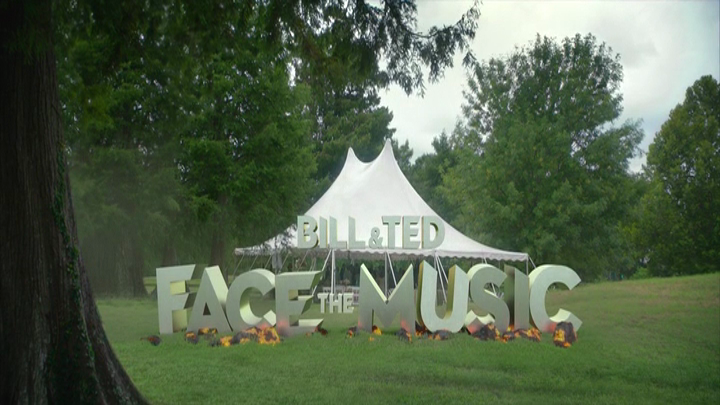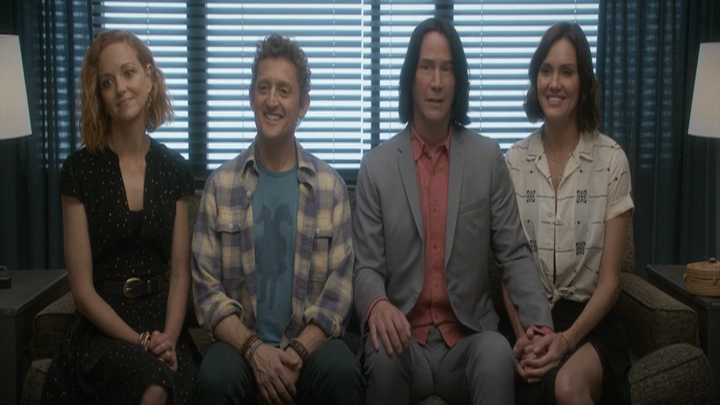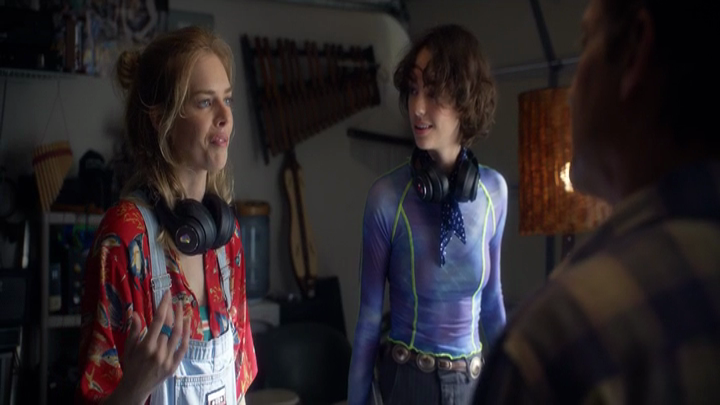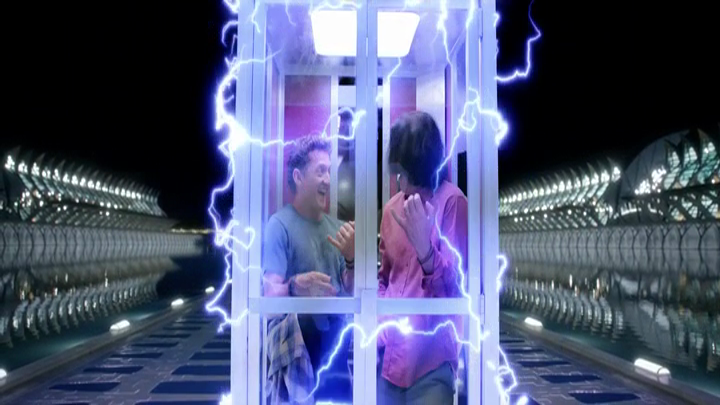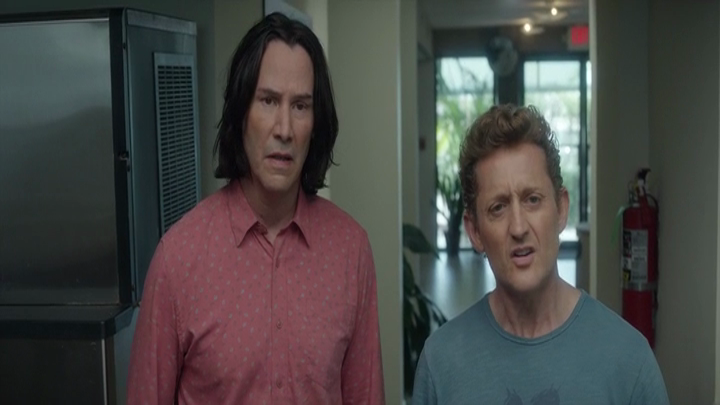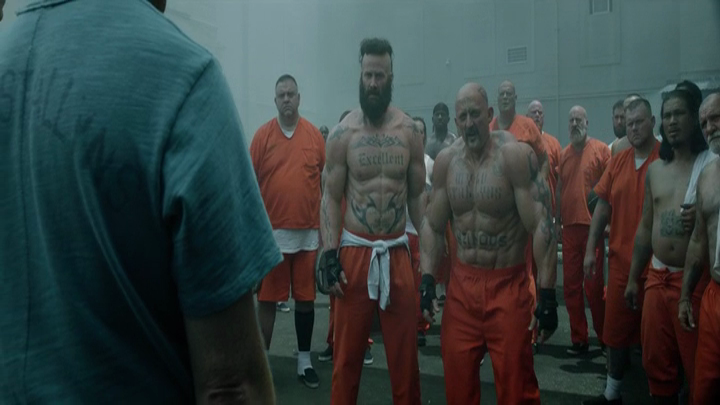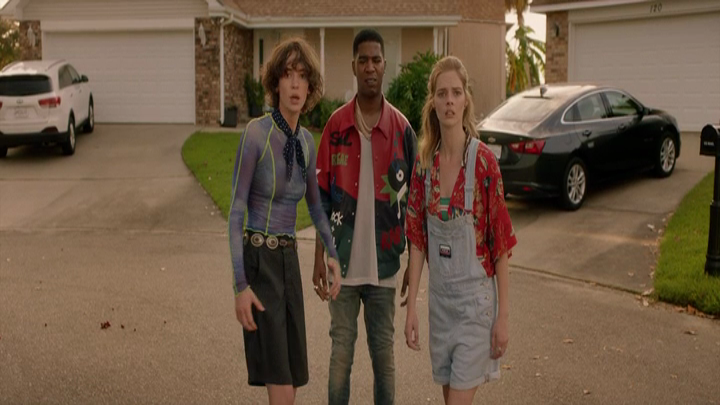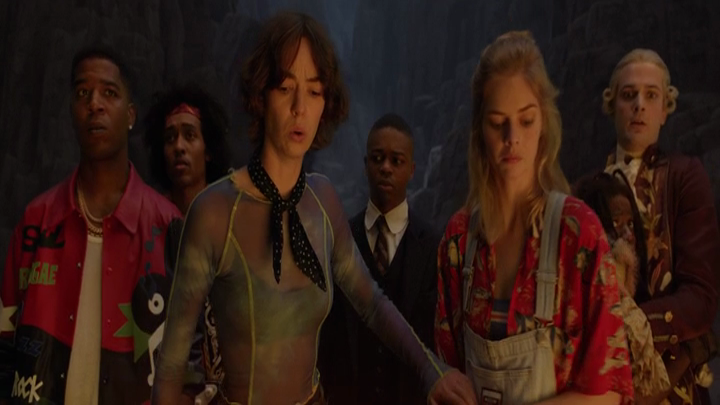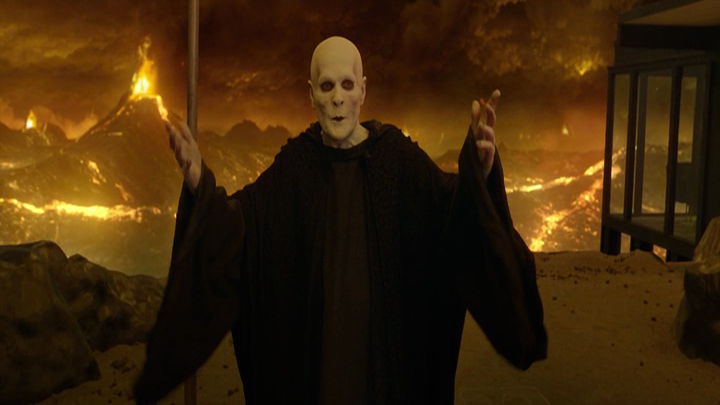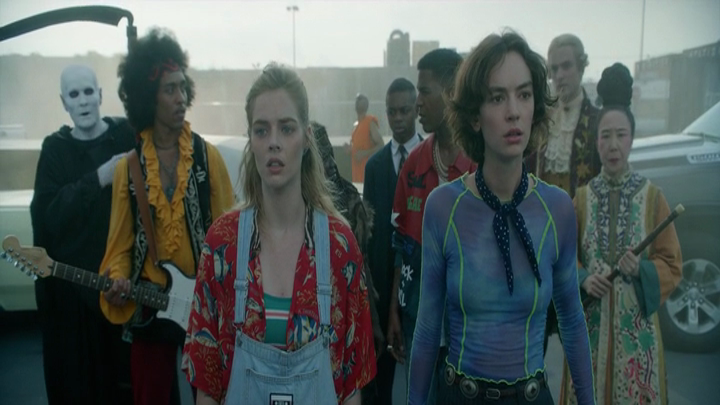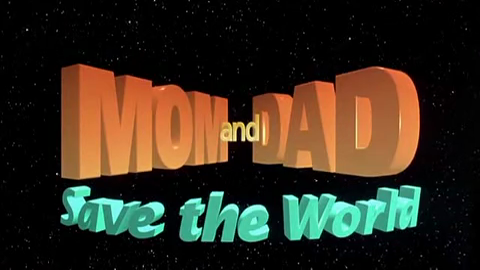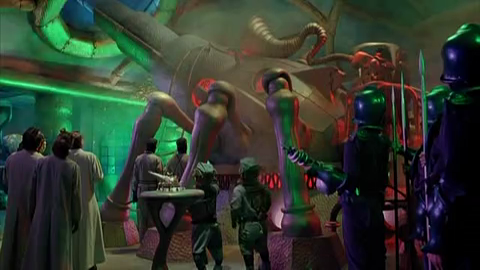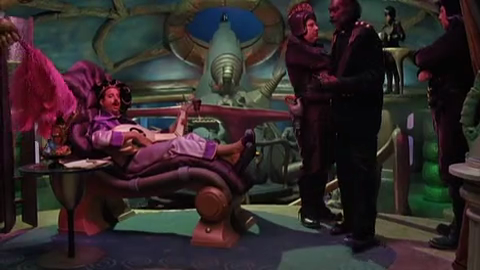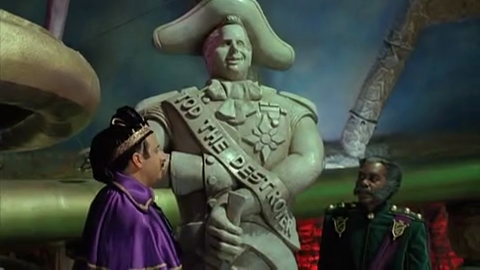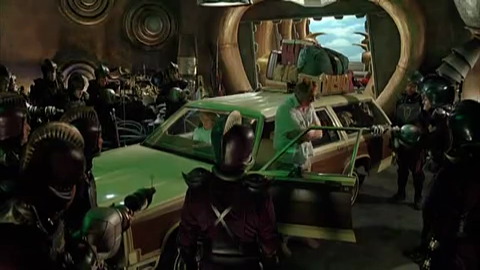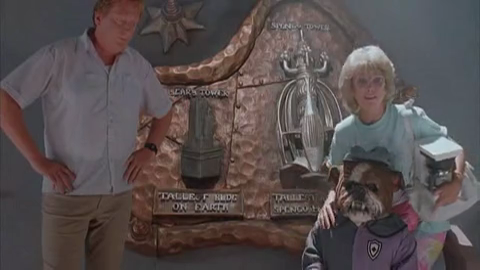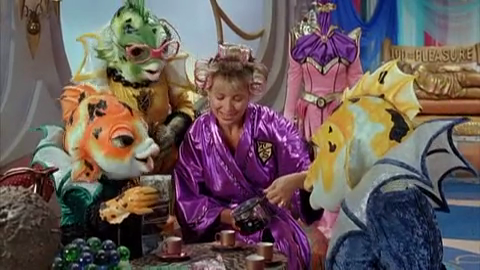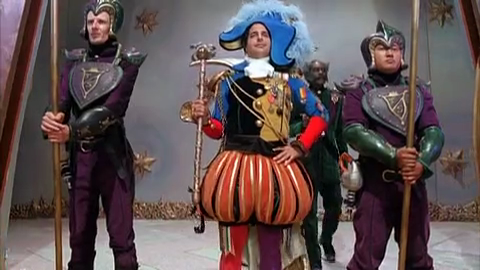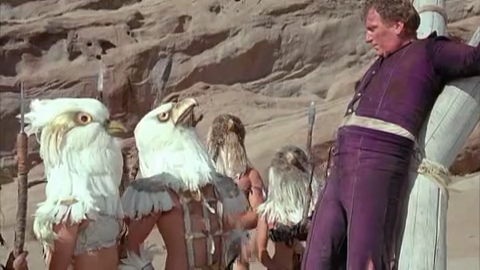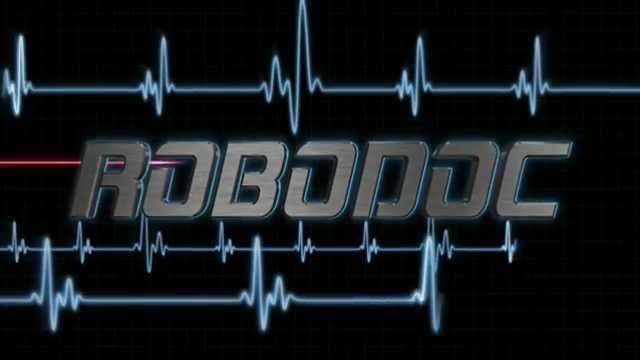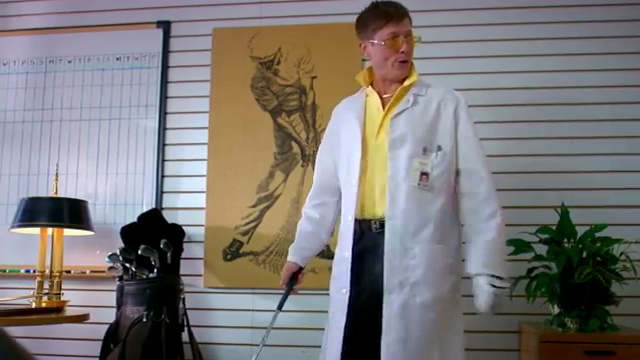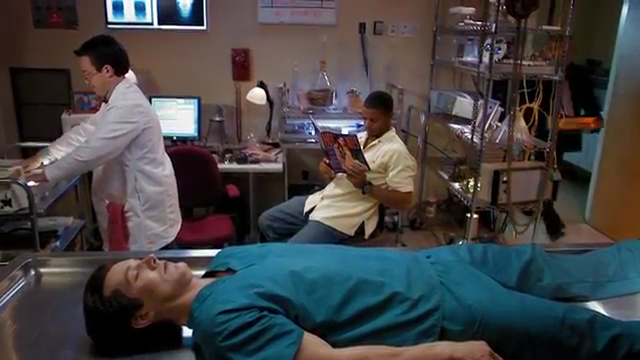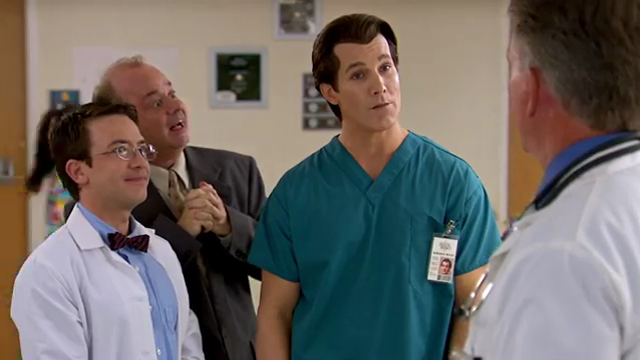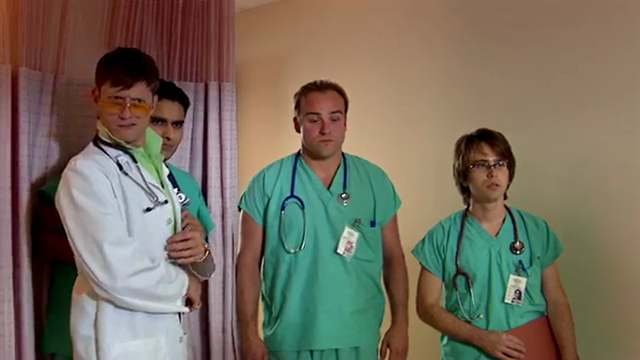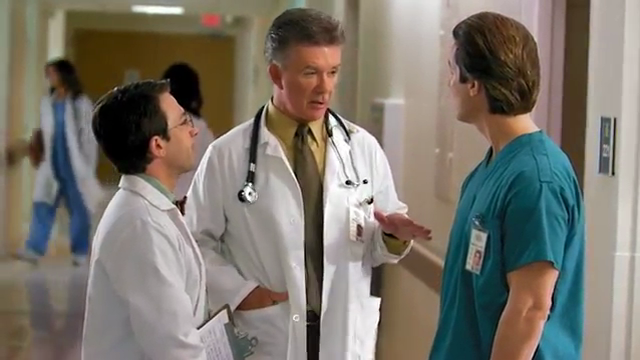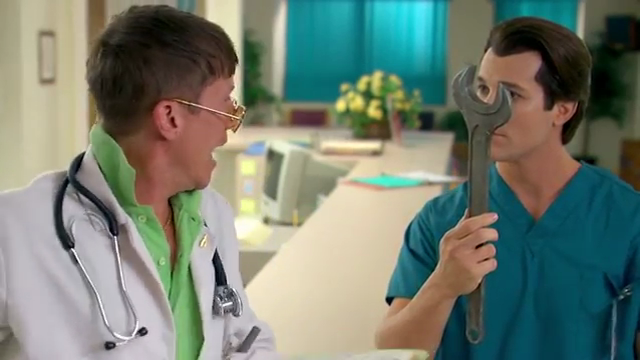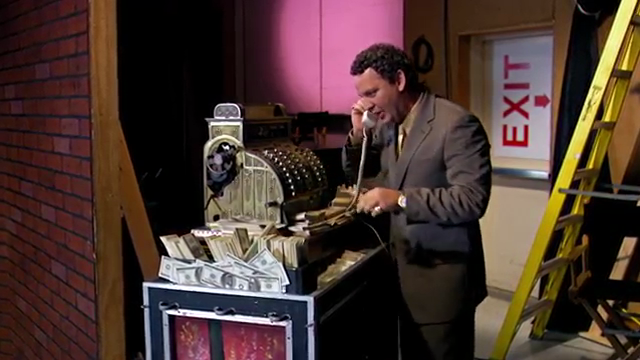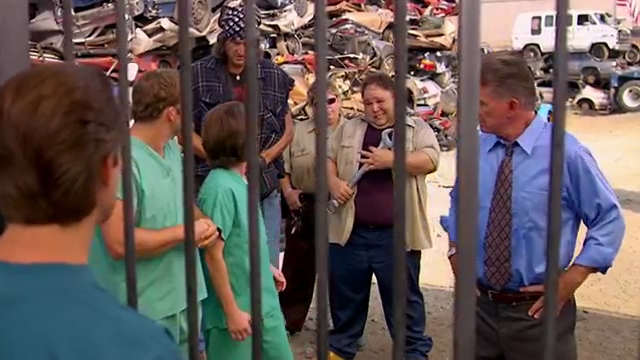-
#419 – Bill and Ted Face the Music (2020)
Bill and Ted Face the Music (2020)
Film review #419
Director: Dean Parisot
SYNOPSIS: Bill S. Preston esquire and Ted “Theodore” Logan were supposed to unite the world through their music. Nearly thirty years after they played a gig to the world, they are still yet to write the song that will they are destined to actually unite the world with. Now married with grown-up children, Bill and Ted are confronted with their failure by being told that reality will cease to exist unless they can write the song. Bill and Ted have the idea to travel into the future and take the song from themselves when they’ve written it, while their daughters Billie and Theo travel into the past to gather up some famous musicians to help them out. However, the Great Leader of the future has lost faith in the duo, and has sent a killer robot to track them down through time and kill them, believing that their deaths may be able to save reality…
THOUGHTS/ANALYSIS: Bill and Ted Face the Music is a 2020 sci-fi comedy film, and the third film in the series, after 1991′s Bill and Ted’s Bogus Journey. The film opens thirty years after the events of the previous film, with Bill and Ted playing the music for the wedding of Ted’s younger brother Deacon, and Missy who was Bill’s step-father in the first film, and Ted’s step-father in the second, which makes for a humourous scene that brings together a lot of the characters of the previous films, and shows what they have been up to in the twenty-five years since we saw them last. However, for Bill and Ted themselves, the last twenty-five years have not been so kind, as they have constantly failed to fulfil their destiny and write the song that will supposedly bring universal harmony and save reality. They are summoned to the future where they are asked to explain their actions, but their usual charm doesn’t seem to be working this time. They are forced to work on the song as the timer counts down to when they must perform it. They have the idea to instead travel to the future and take the song from themselves when they have written it, and so begins another ‘excellent adventure’ for the duo as they travel to various points in their future to find the song they supposedly have to write. After a thirty-year gap between films, there is undoubtedly a lot of expectations for someone who grew up watching these films for this new one to live up to the nostalgia of the first two. Thankfully, and perhaps even surprisingly, this film manages to capture the feel of the previous films, while also taking them somewhere new through the future and possible realities. At the heart of it though, is still this unshakeable friendship between two rock-loving guys which forms the basis for bringing out the very best in the entire universe. The film acknowledges its predecessors through both returning many of the characters, and also small little references which will make you laugh if you recognise them. The Bill and Ted films were never perfect or perfectly-polished masterpieces; they were just a fun adventure about two ordinary guys who have extraordinary adventures, and this film fits in perfectly to that. It didn’t have to be made, but it was made for the fans that have such a fond memory of the films, and through the return of the original writers and many of the characters, it’s hard to see how they could have made a better movie to round off the trilogy. Like I say, the previous films aren’t perfect and neither is this one, but again that nevertheless binds them together.
The main plot of the film is mostly split into two: firstly, you have Bill and Ted travelling to visit themselves in the future to find the song that they will supposedly write, and take it back to the present. In doing so, they come across many versions of themselves where they didn’t write the song, and their lives have fallen apart, including their wives leaving them. Bill and Ted, through this constant time-hopping, are brought into contact with the consequences of their actions, and try to avoid their bad futures by fixing the present. This again reflects the tireless wholesomeness of the duo as they recognise their mistakes and try to do everything they can to fix them. They are also being chased down by a robot from the future, sent by the Great Leader who believes that since Bill and Ted fled from the future and making the song, another interpretation of how to save reality would be to kill them, and so she sends the robot to do it. The series has never really needed villains: in the second film, the villain doesn’t really have much of a role to play himself, but rather just sets things in motion. The driving force of the films has always been about Bill and Ted learning something and improving themselves, rather than defeating an overarching villain, and again, this film does that too. The killer robot does have a small redemption arc as he is integrated into the cast, and it again shows how Bill and ted can win over just about anyone. The other main plot point concerns Bill and Ted’s daughters Billie and Thea, as they try and help their Dad’s out by travelling into the past and collecting famous musicians to help with performing the song. This element of the plot is a little weaker than the scenes focusing on Bill and Ted, and is quite similar to the first film. Nevertheless, there’s still plenty of laughs to be had, and Billie and Thea are genuinely likeable characters, in that they reflect their Father’s mannerisms and optimism, combined with being adults of the 21st century. More could have been done with their characters, but I think keeping focus on Bill and Ted themselves is the appropriate decision. Kelly, who is the daughter of Rufus, the duo’s mentor from the first two films, is also a fun character who doesn’t have the coolness of her father, but is still doing her best. Although she is not her Father (the actor who played him, George Carlin, passed away between the film), her belief in Bill and Ted reflects that constant returning theme of how a simple optimism, while not being afraid of confronting reality, can make a difference, even if you’re not as cool as Rufus.
As I mentioned, i have very little criticisms regarding the film, but there are definitely some things which stand out as being issues. While the majority of the film is well balanced and structured, the last part feels a bit rushed, with everyone getting together and a lot of references being used which leaves little time to appreciate them, and the magnitude of, for example, returning from the dead. Perhaps the main hindrance is the lack of budget: it is obvious that a lot of the scenes from the future etc. are done on greenscreen, and makes some of them feel a bit static and lifeless compared with the energy and often weirdness we got in the previous films. None of the films are very high budget, and that’s part of the charm in that the ordinariness of the leads juxtaposes against the bizarre situations they find themselves. The ending of the film had a revelation that was quite easy to spot ahead of time, and it accomplishes what you expect and want it to: it goes big for the big finale which saves reality, but again I feel like it needed just a little more spectacle than the budget could afford. Nevertheless, It is definitely satisfying, and does the story justice. One cool little feature is that the countdown to the time that Bill and Ted have to perform their song is exactly in synchronicity with the runtime, adding that little extra investment. The song itself that they perform is pretty much perfect: it combines a host of instruments that encapsulate the diversity of reality while having that distinct classic rock/metal sound that Bill and Ted is known for. The fact that it has no lyrics also reflects how the power of music transcends language. It sounds like the song I’ve been waiting thirty years to hear. The more I think about it, the more I appreciate it, and I think this just reinforces just how this film nailed exactly what Bill and Ted is about and how it did exactly what it needed to thirty years later.
Overall, Bill and Ted Face the Music is a worthy, and fully-formed addition to the beloved series: it doesn’t feel like a cash-in or a pointless add-on, but takes the characters people remember fondly and allows them to fulfil the potential they have been destined for for thirty years. It’s a love-letter to those people who grew up with the characters and have a nostalgia for them, and the film never feels like a disservice to that nostalgia, which in itself is a remarkable achievement if you look at other franchises which try to do the same thing. Even though the previous films explored all that could be explored through both the past and after-life, Face the Music still offers something new in the travels through the future and confronting their alternate selves, and the weight of their actions. Throughout it all, even when Bill and Ted are despondent in their lack of success in writing their world-changing song, their simple, but persevering optimism always sees them through the darkest of times. Alongside this, this optimism does not blind them to confronting the mistakes they have made, and are constantly trying to fix things (they continually “face the music” in more ways than one). Face the Music really captures the themes of the series, and brings them together in a satisfying way. It’s not a perfect film, but neither were it’s predecessors, which makes them fit together well. The film is visually hampered by it’s lack of budget and over-reliance on greenscreen, but those are really minor issues that don’t detract from the film’s story and message. For any fan of the previous films who remembers them fondly, Bill and Ted Face the Music is both a worthy tribute and a successful continuation of the story of two ordinary teenagers who have gone on to accomplish extraordinary things.
-
#368 – Mom and Dad Save the World (1992)
Mom and Dad Save the World (1992)
Film review #368
Director: Greg Beeman
SYNOPSIS: Dick and Marge Nelson are driving on their way to spend the weekend away for their anniversary. On the way, they are abducted and taken to the distant plant Spengo, where it’s evil emperor Todd intends to marry Marge himself before he destroys Earth with his “Super Death Ray Laser”. Dick must find a way to rescue his wife and save the Earth while also contendng with the local rebels and a bad back, so it probably won’t be easy…
THOUGHTS/ANALYSIS: Mom and Dad Save the World is a 1992 sci-fi comedy film. The film starts by introducing married couple Dick and Marge Nelson, who are about to drive on their anniversary getaway. However, they end up going a lot further than expected, as their car is abducted and taken to the far away planet of Spengo, where the ruler of the planet, the evil emperor Todd plans to marry Marge himself before blowing up the Earth with his “Super death Ray Laser”. The plot really is this simple, and essentially revolves around Todd trying to marry Marge, and Dick trying to stop him and rescue his wife. From the outset we see the couple are pretty average, with kids and some issues between them, but nothing that majorly stands out: Marge wants to be more adventurous, while Dick is unwilling to go beyond his comfort zone. Meanwhile we see the evil emperor Todd is a bit of an incompetent and non-threatening villain (not least because his name is Todd), and the whole film just has that cheesy, silly tone to it that shows it is not meant to be taken seriously. I suppose it is primarily a comedy film with some sci-fi and adventure elements as this middle-aged couple attempt to overthrow this not-so-evil dictator. The pair make for unlikely heroes, although their characters don’t offer too many surprises, it is unusual to see those types of characters in this type of situation, so it does make for a bit of a unique experience.
Although the film offers little surprise in terms of story or characters, there are some more noteworthy aspects to it. Firstly, there are enough jokes that land to make this film entertaining enough to sit through. There’s some occasions where it can get a genuine laugh, and others where it maintains the humour throughout, such as the “light grenade” scene. Most of the humour is family friendly, but there’s some jokes only an adult will get, so there’s a variety in there that will appeal to a wide range of audiences. Most of the humour however is pretty goofy and slapstick, as the planet Spengo is self described as a “planet of idiots”, and the plainly average Dick is regarded as a genius compared to them. Another positive to the film is the some of the production aspects. The alien costumes, which are anthropomorphic dogs and fish, are quite well done, and are able to convey a range of facial expressions that give them real character. The rest of the special effects are fairly typical of their time, but there’s clearly a decent amount of effort gone into creating the setting and characters. One other interesting note is that the actor for Todd voices Artie in The Simpsons, who on more than one occasion also attempts to steal Marge from her husband, making a very obscure reference.
Overall, Mom and Dad Save the World is a rather average film. It’s premise is silly, and it delivers some silly humour as you would expect. There’s some genuinely funny moments using a range of humour, and the costume designs are pretty good, so while not being the most stand-out film of all time, manages to be entertaining enough to warrant sitting through it.
-
#362 – RoboDoc (2008)
RoboDoc (2008)
Film review #362
Director: Stephen Maddocks
SYNOPSIS: A hospital is being constantly plagued by lawsuits from a greedy ambulance-chasing attorney. With another doctor quitting and the hospital fast running out of money, Dr. Roskin arranges for a new doctor to be sent, but doesn’t expect R.I.P. Healthcare to send a robot doctor, who is seemingly able to carry out medical duties without ever making a mistake. This causes problems for Jake Gorman, the attorney who is making money off all the malpractice cases, and working with Dr. Callaby, another doctor at the hospital who is in league with Gorman, the two try to find a way to stop “RoboDoc” before their money-making scheme is ruined…
THOUGHTS/ANALYSIS: RoboDoc is a 2008 sci-fi comedy film that somewhat parodies the RoboCop films, as the name implies. The film starts out introducing Jake Gorman, an ambulance chasing attorney who has made himself rich by suing doctors for malpractice. His constant lawsuits are pushing the North Mercy (or “No Mercy”) hospital to its limits, with doctors continually quitting and having their lives ruined. The opening of the film consists of a variety of gags and satirical looks at the U.S. healthcare system: from the ambulance-chasing attorneys, the lack of insurance for patients, and the ambulance driver adorning a racesuit, there’s a decent amount of content to get into. RoboDoc was written by two M.D.’s and so obviously they have the necessary experience to write about the setting of the film. I think there was definite potential in the outset to make this film offer a more thorough critique of the healthcare system through a comedic lens, but the film takes it in a completely different route and goes for just another raunchy comedy like so many we’ve seen before. Even in this direction, it needs to push some boundaries in order to be effective, but again it just doesn’t do enough to make it stand out.
After another such incident of a doctor quitting over a lawsuit, Dr. Roskin, the chief of medicine arranges the R.I.P. Healthcare company (who fund the hospital) to send another doctor, which they do, in the form of MD-63, a robotic humanoid doctor who is appointed to the hospital. While Dr. Roskin, a technophile, is reluctant to let a robot do a doctor’s job, he is slowly convinced when he sees that “RoboDoc”, as he is nicknamed, is able to complete any form of care or surgery without mistakes, and thus making him impossible to get sued. This is the core plot of the film, with RoboDoc having to earn the trust of his fellow staff, as well as learn about compassion and the elements of care that go beyond his programming. These are all story elements that have been done to death, and so there are no real surprises here. The character of RoboDoc is also essentially a carbon copy of Data from Star Trek: The Next Generation; right down to the look and voice, which is a recognisable character, but again fails to bring any originality to the RoboDoc role, and doesn’t even satirise it. The actor playing RoboDoc does do a good Data impression though. The character of Attorney Jake Gorman also is well played, and his over-dramatic performances bring some life to the scenes he is in. The rest of the cast are pretty forgettable (apart from the few scenes with the character played by Michael Wimslow from Police Academy), and don’t have much significance in the story. There are the starts of some sub-plots initiated by these characters, but they never really go anywhere, making their roles rather muddled.
RoboDoc is not a high budget film, and has to make do with a fairly limited range of effects. These effects are not particularly convincing, and combined with the uninspiring camera work and wooden acting from some of the actors, you will struggle to take it seriously. There are some positives as I have mentioned, and there are some more obscure references and satirical swipes that are more rewarding than the cheap innuendo jokes. The comedy on the whole does stick mostly to that juvenile, raunchy humour but offers nothing particularly new or memorable. Nevertheless, the film does garner a decent amount of laughs, and so as a comedy film it can’t be said to be a complete failure. RoboDoc is an uninspiring mess for the most part, but there are a few good performances and jokes that make this entertaining enough to watch if you’re not paying too much attention to some of the weaker characters and scattered story that often branches into meaningless dead ends.
